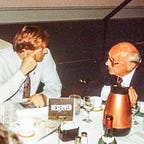The Alternative of Market Liberalism
Market liberalism establishes a basic principle for how people should deal with one another: all interaction should be by mutual consent. Each individual is free to pursue their own happiness in a regime of freedom, regulated only by the equal liberty and rights of others.
The proper method of economic interaction is one where individuals trade value for value. In a truly liberal society, the economy is one of depoliticized markets, property rights, and equality of rights before the law.
Individuals seeking their own well-being are free to produce goods and services for exchange with other individuals, who are also seeking their own benefits. No trade takes place in such a marketplace unless all trading partners believe they benefit. To improve their own lives each must improve the lives of others, even if this is not their intent.
In a society where government is limited to the protection of rights, individuals may pursue varying sets of values. This means economic freedom but it also means social freedom. Peruvian author Mario Vargas Llosa noted, “According to this concept of liberalism, freedom is a single, unified concept. Political and economic liberties are as inseparable as the two sides of a medal.”
Liberalism is the only system that allows for pluralism, or the pursuit of contradictory sets of values by individuals. The function of the state is not to impose one set of values on everyone, but to allow the free exchange of goods, services, and ideas. It protects, equally, every group within the society, but does not place the values of any one group higher than the rest. Liberalism respects the most important right: the right to think for yourself. It does not seek to control the mind, but leaves individuals free to use their rational faculties to the best of their ability.
Economist Ludwig Mises, before he was forced to flee the Nazi regime, wrote, “The ultimate ideal envisioned by liberalism is the perfect co-operation of all mankind, taking place peacefully and without friction. Liberal thinking always has the whole of humanity in view and not just parts. It does not stop at limited groups; it does not end at the border of the village, of the province, of the nation, or of the continent. Its thinking is cosmopolitan and ecumenical: it takes in all men and the whole world. Liberalism is, in this sense, humanism; and the liberal, a citizen of the world, a cosmopolite.”
South Africa’s Alan Paton, a famed novelist and opponent of apartheid, put it this way: “By liberalism… I mean a generosity of spirit, a tolerance of others, an attempt to comprehend otherness, a commitment to the rule of law, a high ideal of the worth and dignity of man, a repugnance for authoritarianism and a love of freedom.”
Applied liberalism means a trinity of basic rights: social freedom, political freedom, and economic freedom, but for the individual to be free, government must be limited. Most liberals therefore advocate constitutional restraints limiting the powers of government. If the purpose of government is to protect the rights of people, then the purpose of a constitution is to limit the powers of government.
Liberalism arose because governments have been the most effective means for the destruction of human rights and human liberties. An all-powerful government — even when motivated by the best of intentions — is a potent threat to human freedom. Liberals believe without freedom humanity cannot flourish and prosper, they have historically spoken of absolute human rights and limited governments. This, they believe, is what a constitution is meant to guarantee.
Liberalism does not espouse one overriding utopian ideal for everyone. It recognizes the diversity of human life, and it understands the pursuit of utopia is far more likely to end up on the road to hell. Karl Popper wrote, “Those who promise us paradise on earth never produced anything but a hell.” Aldous Huxley had a similar warning: “In practice, faith in the bigger and better future is one of the most potent enemies to present liberty: for rulers feel themselves justified in imposing the most monstrous tyranny on their subjects for the sake of the wholly imaginary fruits…” at some future date — a date that never seems to arrive.
Market liberals propose a society based on equal rights and equal liberties where each person is free to seek their own happiness, provided they respect the equal rights of others. Only in this free society is there the chance for substantial prosperity, and only when they are free from hunger and disease are they capable of pursuing their higher values and happiness — whatever they may be.
Your support to fund these columns is critical, visit our page at Patreon to make a $10 pledge. If you wish to pledge another amount per month you can do so at this link — anything starting from $1 and up. All of it helps especially now.
